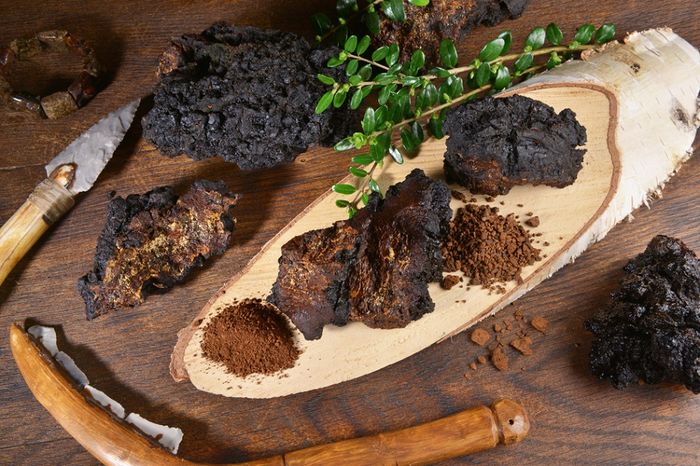Chaga Mushrooms: Risk Factors & 3 Potential Side Effects
Updated January 7, 2024.

Chaga is a non-hallucinogenic functional mushroom that promises a wide range of benefits. However, it also poses a risk of potential side effects, especially in certain people.
Adverse Reactions From Chaga Mushrooms
To learn all about the chaga mushroom, view our Chaga Mushroom guide for all the details surrounding this incredible ingredient.
1. Chaga Mushrooms May Cause Dangerous Hypoglycemia
One of the widespread benefits of Chaga mushrooms is that they might benefit diabetes and heart disease. Research has shown that Chaga mushrooms can lower blood sugar levels as well as cholesterol levels. Although this suggests that Chaga mushrooms might be beneficial for diabetes, it also poses a risk of dangerous hypoglycemia (low blood sugar) if taken with prescription diabetes medication.
2. Chaga Mushrooms May Interfere With Blood Clotting
Studies have shown that Chaga mushrooms exhibit inhibitory activity on blood platelets, specialised cells responsible for blood clots. This might be beneficial in improving blood pressure, as well as lowering the risk of pulmonary embolisms (blood clots in the lungs), but it could also pose a risk for individuals with bleeding disorders. Additionally, regular intake of Chaga mushrooms could result in easier and more frequent bleeding and bruising.
3. Chaga Mushrooms May Harm Your Kidneys
When discussing the potential side effects of various functional mushroom types, the topic of liver and kidney disease often comes into question. While most species of functional mushrooms seem to pose no risk of liver or kidney damage if taken regularly for less than a year, the same is not necessarily true for Chaga mushrooms.
A study published in the Journal of Korean Medical Science found that Chaga mushrooms contain higher oxalate levels than other functional mushrooms, a derivative of oxalic acid. Excess consumption of oxalates has been linked to an increased risk of gout, kidney stones, and even chronic kidney disease.
Who Is at Risk for Chaga Mushroom Side Effects?
While side effects are not commonly reported from Chaga mushroom teas, drops, powders, or extracts, they are not unheard of. That being said, several individuals are more at risk for developing these side effects than others, such as:
- Those with bleeding disorders Due to the potential for Chaga mushrooms to reduce blood clotting, those with bleeding disorders could react negatively.
- Those expecting surgery soon Bleeding is a frequent problem during surgery, which can be exacerbated if your body's blood-clotting mechanism is compromised.
- Those with mushroom or mould allergies Since Chaga mushrooms are a species of fungus, individuals with preexisting allergies will likely react negatively to Chaga.
- New and expecting mothers Although Chaga mushrooms appear relatively safe, absolutely no studies have looked at the risk of side effects to unborn and breastfeeding babies. It is unknown if you can drink Chaga tea while pregnant and if it is safe while breastfeeding. As such, it is strongly advised that new and expecting mothers stay on the safe side by avoiding Chaga altogether.
Chaga Mushrooms and Autoimmune Diseases
Chaga mushrooms are known to benefit the immune system, which, in theory, might be a potential risk for those with autoimmune diseases like rheumatoid arthritis, in which your immune system perceives healthy cells as dangerous and attacks them anyway. However, emerging research suggests that many functional mushrooms are immunomodulatory instead of immunostimulatory, which could actually benefit autoimmune diseases.
Essentially, it means that more research is needed and that individuals with autoimmune diseases should proceed with caution and consult medical professionals before using Chaga.
How Much Chaga Is Too Much?
Unfortunately, there is no strict set of guidelines to determine what the optimal dosage of Chaga is. As such, it is important to adhere to the recommendations listed on the product. Most scientific studies use amounts of less than 5g taken daily, though some experts recommend not exceeding 3.6g/day.
Are Chaga Mushrooms FDA Approved?
Caution should always be exercised when deciding to use Chaga mushroom elixirs due to the potential side effects, especially because Chaga mushrooms are not approved by the FDA. As such, there are no recommended doses and precautions, which stresses the necessity of always purchasing from a reputable source and monitoring yourself closely for any emerging side effects.
Additionally, you should learn how to tell if your Chaga has gone bad. Since it is a mushroom, it will go mouldy if exposed to moisture and will typically look like it is covered in confectioners sugar, as well as giving off a foul rotting odour. Do not consume bad Chaga mushrooms.









